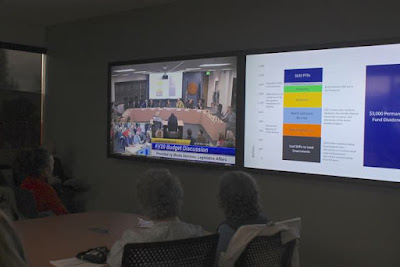From an LA Times article
The University of Southern California’s $69-million sale of naming rights for Los Angeles Memorial Coliseum is being criticized as dishonoring the historic stadium’s dedication as a memorial to soldiers who fought and died in World War I just a few years before it opened.(USC took over control of the Coliseum in a 98 year lease in 2013. More details here.)
I personally became concerned about selling naming rights back around 1965 when UCLA built a new basketball stadium on campus and named it Pauley Pavillion, for the oil mogul who paid for naming rights instead of for John Wooden who had recently worked miracles with his Bruin basketball team.
When I was growing up, stadiums and other public places weren't plastered with billboards. You could watch sporting events without being bombarded by corporate logos. In fact, corporate branded T-shirts and other such swag were actually given away to people. It was part of companies' advertising budget.
Since then, companies have somehow convinced people they should become human billboards for their products, but the billboards, not the companies, should pay for the opportunity. But that's another blog post.
The Coliseum naming gave me an idea. Why not let corporations or even individuals, buy the naming rights to all the offensive statues still standing in the US. In most cases, there are few if any people still living who knew the statues' models or would recognize their faces. You could have the "[Insert Name Of Corporation] Horse and Rider." Instead of spending money to tear the statues down, cities and towns can make money from them.
But my favorite option, one I came up with as a UCLA student, is to have plaques next to buildings and statues that tell the reader all the shady things the donor had done to make the money being used now to name the building. And offending statues, whether built to commemorate defenders of slavery or killers of Native Americans, or polluters of the air and water, or the swindlers of the poor, could have the deeds listed that make the statues embarrassing today. If we erase history, it's hard to learn from it.
My understanding of this was broadened as a sixth grade teacher in Los Angeles. My students were all black and we figured out a way to work with each other so they learned something and I felt reasonably productive. One day I was was reading from one of my favorite childhood books, The Story of Doctor Doolitle. I had my own copy with me in class. We were a few chapters in and I was reading out loud to class. Dr. Doolitle and Polynesia were in Africa when the good doctor used a racist term for the native peoples. Whoops. I didn't remember Dr. Doolittle as a racist, but it was clear now it was part of his culture. I stopped in mid-sentence and told the students it was time for our next activity. What I SHOULD HAVE DONE was explain why I was stopping and then had an authentic conversation with them about racism. They would have understood. They were angry with me because the Dr. Doolittle book disappeared.
I should also note that I went to day care, K-12 schooling, college, and graduate school in Los Angeles. When I saw the LA Coliseum on television during the 1980 Olympics in LA, I realized that it was one of the landmarks of my life. I spent time at the Coliseum all the while I was growing up. It was the setting for a diverse array of activities from rodeos and boy scout jamborees, from early LA Dodger games before Dodger stadium was built, to UCLA football games. And it was just south of campus when I was a grad student at USC. So there is a personal connection to that structure that is important to who I am. And last December when we visited the Tutankhamun exhibit at Exposition Park, we walked over to the Coliseum ticket office that was surrounded by wooden barriers during the Coliseum's reconstruction. But I do have this list of rules that I certainly don't remember from my childhood visits.
I, of course, am a supporter of keeping the old name. My alma mater, USC, has become one the best fund raising universities in the world in the last decades. That money credo has improved the academics, but it has also made money more important that ethics and other human values - like respecting history. (For those who have missed it - USC, who now manages the Coliseum, has been wracked with scandals in its medical school as well as other programs, most recently the admissions scandals.) So, the idea of changing the name of the Coliseum for $69 million is not even a decision. It's a given. It's been their modus operandi for a long time. For a price, we'll do anything including looking the other way.
Is there a point to all this? Yes. Remembering good things, like the Coliseum as a Los Angeles memorial to WW I dead and NOT auctioning off its name to the highest bidder, and dealing with the statues of fallen heroes or the misdeeds of corporate branders are all of the same issue. I think I advocate for dealing with the past as openly as we can. I don't mean 'can' politically, but rather 'can' in the sense that we are aware enough of the good deeds or misdeeds of whom or what is being remembered. Let's acknowledge our collective misdeeds of the past as well as our collective good deeds. And where we don't agree, let's sit down and talk about values that these people, entities, events embody and how they connect with who we are as a nation today.
[Yes, this could use a couple of rewrites before posting, but I've got posts waiting in line to be written and I've got grandkids to go pick up right now.]




















